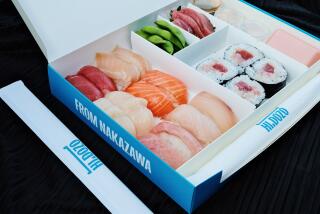Japanese Indulge a Taste for Fine Food
- Share via
TOKYO — It’s Friday night, and the set is really cooking.
The “Iron Chef” and his challenger are locked in combat before a panel of steely-faced judges. As the battle reaches a crescendo, the TV screen cuts to instant replay.
Commentators oooh and ahhh--the brash challenger has sent a huge seafood omelet somersaulting gracefully into the air from his frying pan.
The “Battle of Iron Chef” show may be wild and campy, but it speaks to the Japanese, as do the countless other cooking shows that fill the television schedule. The Japanese, while perhaps not known for it overseas, are among the most devoted food fanatics in the world.
They put their money where their mouths are, spending more than anyone else on going out to eat. According to the London-based market research firm Euromonitor, the Japanese spend an average of 197,000 yen each in restaurants every year. That’s $1,670, about twice what Americans and the French shell out.
Such figures shouldn’t come as a surprise, says food consultant Masako Ogawa, who recently returned from a tour of France and Italy devoted exclusively to visiting exotic cheese makers.
“I believe Japan has a highly developed culinary sense--at least as high as the Chinese or the French,” she says. “We’re surrounded by wonderful flavors from the sea and the mountains, so we’ve learned to appreciate fine tastes.”
For many Japanese, eating out a lot is a necessity because they usually live far from where they work and have tiny apartments. Streets in some densely packed neighborhoods have nothing but small restaurants and bars for several blocks.
But it’s also Japan’s love of fine food and willingness to pay top yen to get it that built this country’s restaurant industry into a $210-billion colossus--an amount larger than the entire economy of South Africa.
Top chefs routinely spend long periods studying in Europe with the masters. A Japanese wine expert, Shinya Tasaki, was ranked the world’s No. 1 sommelier in 1995, and France’s top-ranked Cordon Bleu culinary school has a branch in Japan.
“Japanese have good taste and they don’t mind paying for it,” says American entrepreneur John Kuhn, who began an exporting business expressly to sell fancy mustards, salsas and salad dressings in Japan. “It’s a perfect market for high-end foods.”
But even the cheaper fare is held up to high standards. “Tampopo,” a modern film classic from satirist Juzo Itami, is a story of a quasi-religious quest for the perfect bowl of ramen noodles.
Still, “Iron Chef” takes the cake for unbounded exuberance about food. In a nation that lusts after top brand names, it gives ordinary viewers a chance to drool over concoctions made by top chefs whose restaurants most people can’t afford to eat in.
The show trots out a panel of culinary experts to explain the techniques used by the competing chefs.
In the meantime, a hyperactive narrator, Shinichiro Ota, wanders with a microphone, blurting out updates from the floor of a giant set known as the Kitchen Stadium.
“We’ve just received word that the challenger’s assistant is using spinach juice to color his dumplings!” he reports breathlessly.
The faceoffs in Kitchen Stadium start with a grandiose call of “A la cuisine!” from sequined showman Takeshi Kaga--loosely rendered from the French as “Gentlemen, start your blenders!” The contests end with a final taste-test from the panel of judges to determine the week’s winner.
Besides this culinary showdown, there are endless other shows on Japanese TV and stories in magazines that explain new recipes for home cooks and show off out-of-the way restaurants.
And there is no sign of the food fuss diminishing.
Some experts believe it will increase as more and more Japanese spend less time at work and seek out luxuries.
“No one can afford fancy cars or houses here,” says Yukio Hattori, one of the country’s best-known epicures and a commentator on “Iron Chef.” “Fine food is one of the only ways the Japanese have to enjoy themselves.”
More to Read
Eat your way across L.A.
Get our weekly Tasting Notes newsletter for reviews, news and more.
You may occasionally receive promotional content from the Los Angeles Times.










